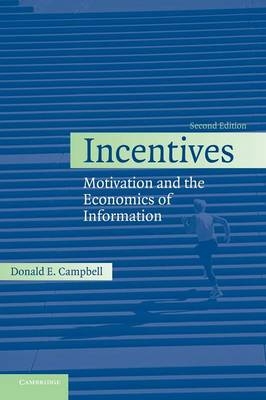
Incentives
Cambridge University Press (Verlag)
978-0-521-83204-5 (ISBN)
- Titel erscheint in neuer Auflage
- Artikel merken
This book, first published in 2006, examines the incentives at work in a wide range of institutions to see how and how well coordination is achieved by informing and motivating individual decision makers. The book examines the performance of agents hired to carry out specific tasks, from taxi drivers to CEOs. It investigates the performance of institutions, from voting schemes to kidney transplants, to see if they enhance general well being. The book examines a broad range of market transactions, from auctions to labor markets, to the entire economy. The analysis is conducted using specific worked examples, lucid general theory, and illustrations drawn from news stories. Of the seventy different topics and sections, only twelve require a knowledge of calculus. The second edition offers new chapters on auctions, matching and assignment problems, and corporate governance. Boxed examples are used to highlight points of theory and are separated from the main text.
Donald E. Campbell is CSX Professor of Economics and Public Policy at William and Mary College, Williamsburg, Virginia, where he has taught since 1990. He previously served as Professor of Economics at the University of Toronto from 1970 to 1990. He is the author of Resource Allocation Mechanisms (Cambridge University Press, 1987), and Equity, Efficiency and Social Choice (1992). His published research has appeared in leading journals such as Econometrica, the Journal of Political Economy, American Economic Review, the Journal of Economic Theory, Review of Economics Studies, and the Journal of Mathematical Economics.
Part I. Equilibrium, efficiency, and asymmetric information: 1. Asymmetric information; 2. Taxi!; 3. Acid rain; 4. Efficiency; 5. Equilibrium; 6. The prisoner's dilemma game; 7. Repetition and equilibrium; Part II. Basic Models and Tools: 8. Maximizing a Quadratic; 9. Overview of calculus; 10. Lagrangian multipliers; 11. The composite commodity model; 12. Quasi-linear preferences; 13. Decision making under uncertainty; 14. Insurance; Part III. Hidden Action: 15. Resource allocation; 16. Marketable pollution rights; 17. Incentive regulation of the telecommunications industry; 18. The savings and loan debacle; 19. Personal bankruptcy; 20. Mandatory retirement; 21. Tenure and the performance of professors; 22. Pay and performance in US public schools; 23. Moral hazard and insurance; Part IV. Corporate Governance: 24. A brief tour of several countries; 25. Partnerships; 26. The owner-employee relationship; 27. The owner-manager relationship in practice; 28. Agency theory; Part V. Hidden Characteristics: 29. Price discrimination; 30. Two-person exchange; 31. The used car market; 32. Credit rationing; 33. Bundling and product quality; 34. Job market signaling; 35. Competitive insurance markets; Part VI. Auctions: 36. Introduction; 37. The Vickrey auction; 38. Four basic auction mechanisms; 39. Revenue equivalence; 40. Applications of the revenue equivalence theorem; 41. Interdependent values; Part VII. Voting and Preference Revelation: 42. Voting schemes; 43. Preference revelation in general; 44. General proof of the Gibbard-Satterthwaite theorem; 45. The revelation principle; Part VIII. Public Goods and Preference Revelation: 46. The economic model; 47. The pivotal mechanism; 48. Groves mechanisms; 49. Efficiency and incentive compatibility; Part IX. Matching: 50. Students and advisors; 51. College admissions; 52. Hospitals and doctors; 53. Allocating dormitory rooms; 54. Kidney transplants; Part X. General Competitive Equilibrium: 55. Competition, property rights, and prosperity; 56. The Arrow-Debreu economy; 57. Non-convex economies; 58. Efficiency and incentive compatibility; 59. Common property resources.
| Erscheint lt. Verlag | 1.5.2006 |
|---|---|
| Zusatzinfo | 106 Tables, unspecified |
| Verlagsort | Cambridge |
| Sprache | englisch |
| Maße | 184 x 262 mm |
| Gewicht | 1217 g |
| Themenwelt | Wirtschaft ► Allgemeines / Lexika |
| Wirtschaft ► Volkswirtschaftslehre ► Wirtschaftspolitik | |
| ISBN-10 | 0-521-83204-7 / 0521832047 |
| ISBN-13 | 978-0-521-83204-5 / 9780521832045 |
| Zustand | Neuware |
| Informationen gemäß Produktsicherheitsverordnung (GPSR) | |
| Haben Sie eine Frage zum Produkt? |
aus dem Bereich



